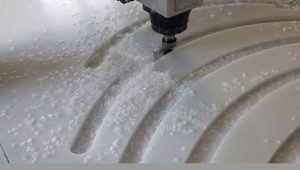
We are often approached by customers who are currently machining their parts out of high-performance plastic materials. How do you decide when it is better to injection mold versus continuing to machine parts?
Injection molding has many advantages. It minimizes molding costs, is very precise, and is a highly repeatable way of producing resin parts. Once set up, molding produces large amounts of parts per hour from many different materials.
While many companies do not have the capacity to injection mold materials, HS Mold has an extensive history of injection molding filled ultra and high-performance thermoplastics resins (PEEK, PFA, FEP, Torlon®, Vespel®, Ultem®, Extem®, etc.), and partnering with world-class polymer scientists and industry-leading material suppliers to develop unique custom resins formulations.
So, how do you make the decision to pivot from machining to investing in an injection molding process?
How many parts do you need?
Plastic injection molding is far less expensive per part than plastic machining. Machining a part is usually 25 times more expensive than an injection molded part. But, the upfront cost of the mold is steep, usually several thousand dollars. So, it makes sense to continue machining as long as your quantity is small.
Will you need to change your design?
As long as your project is still in the development stages of your design, you should continue to machine. It doesn’t make financial sense to invest in an expensive mold if your design is not final.
The preciseness of your part.
The more precise your part. While injection molding is very precise – within .005 inches – parts that have tolerances within .001 inches of specifications may still need to be machined. The decision ultimately lies in the nature of the product. Clients in medical equipment often continue to machine for its precision. Others – such as integrated chip clients can tolerate slight variations.
How perfect your part needs to be?
Plastic injection molding can produce slight cosmetic imperfections that may or may not be acceptable based on your product. Machining is likely your preference if your part can not display even a minor cosmetic defect.
Material
Your selection of resin materials is more limited to plastic injection molding. Some harder, high-performance materials can only be machined.
To learn more about how HS Mold can cut your production costs while helping you take advantage of the unique properties of engineered materials, please visit our contact page or contact Susan, our custom mold manager of sales and marketing, at susan@hongshengmold.com.


